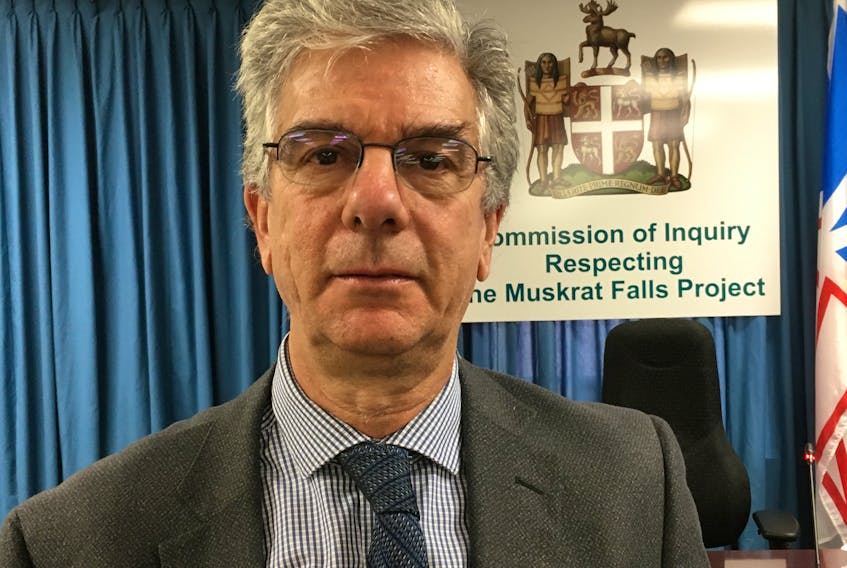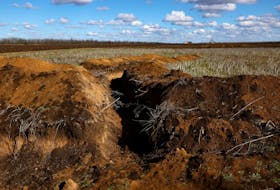The executive director of the Helios Centre was back on the stand at the Muskrat Falls Inquiry on Friday, suggesting an incomplete review of the proposed hydroelectric project before its sanction in 2012, but Philip Raphals also acknowledged there were detailed documents he was not aware of from that review process, from the period after he was retained and filed review.
Raphals said more could be done to aggressively manage energy use in the province. He also suggested the alternative to Muskrat Falls considered by the Public Utilities Board (PUB) — the “isolated island” option — did not properly consider additions of wind power.
“I think everyone acknowledges Newfoundland has a world-class and very extraordinary wind resource,” he said. “So then the question is: what can you do with that?”
Raphals referred more than once to reports from early 2012 or earlier. Nalcor Energy lawyer Dan Simmons directed him to a detailed timeline for the “isolated island” power plan, as it was reported by Manitoba Hydro International (MHI) in late 2012, before a final decision. It would have come after Raphals’ review of provincial energy plans, and Raphals said he was not familiar with it. It was a piece of work completed and put to the utility after Raphals’ involvement.
RELATED STORIES:
Labrador activist repeats concerns at Muskrat Falls Inquiry
Concerned Citizens face grilling at Muskrat Falls Inquiry
The later report showed the final, alternative option to Muskrat Falls hydro considered included 25 megawatts (MW) of new wind production installed in 2015, followed by 50 MW in 2020, 50 MW in 2025, 50 MW in 2030 and replacements of existing wind power generation atop the additions. Simmons noted there is also existing wind power on the island system.
At another point, Raphals acknowledged that when he was speaking critically of limitations in Muskrat Falls’ power production in terms of potential outside energy sales, he was not considering the use of the hydro project in tandem with the rest of the power assets on the island.
His professional credentials were reviewed by Simmons on the record, as part of the cross-examination. In terms of formal education, he has a bachelor of arts degree and a master’s degree in music, but no training in public policy, engineering, finance, law or energy-related fields. Raphals said he gets questions related to his education all the time, acknowledging a change in careers over time.
As for why he did not go back to pursue formal study, as he pursued work as an energy consultant, he said, “I didn’t have time. I’ve been exceedingly busy. I have one interesting project after another and it never seemed to me to be really something that was worth investing the time.”
As noted in his CV, he became a freelance science journalist (to 1992) and eventually moved into consulting work as an independent energy analyst, founding the non-profit Helios Centre. It is a research organization “dedicated to the analysis of energy regulatory or investment options and the design of strategies and policies for the sustainable use and development of energy resources.” The centre has a board of directors and is currently growing, Raphals said, but given financial constraints there have been times in its past when it has had no full-time employees.
Less time was spent by Simmons on Raphals’ work since 1992 — his development as an energy consultant and more than 20 years working as an analyst.
Raphals was not brought in as an expert witness for the Muskrat Falls inquiry, but he has provided testimony as a recognized expert during the proceedings of Canadian energy regulators, including the Nova Scotia Utilities and Review Board (UARB) and Newfoundland and Labrador’s Public Utilities Board. His work as an analyst has served energy associations, non-profits and utilities. He has also offered time as a post-secondary guest lecturer and energy conference presenter, speaking to energy markets, resource planning and policy.
At the Muskrat Falls Inquiry, he was called as a witness to address his involvement in the environmental review and work for the Grand Riverkeeper (being work before the internal report referenced by Simmons), and was given room to speak about any concerns with the project as it was presented to him and the public at the time, prior to sanctioning.
One area he was not questioned on was the water management agreement for the Churchill River hydro project. Commissioner Richard LeBlanc said it was an area his co-counsel were planning to deal with on a single day, later in the schedule, but Raphals could be recalled as needed to speak about any of his past, related commentary.
NOTE: This story has been edited to highlight the day was dominated by cross-examination. It has also been edited to note more from Philip Raphals’ CV, including his past participation in regulatory proceedings across Canada.









